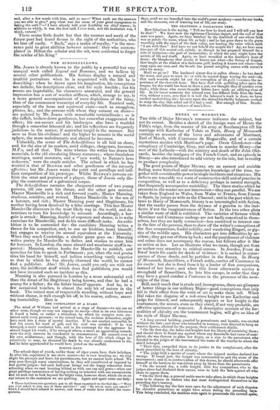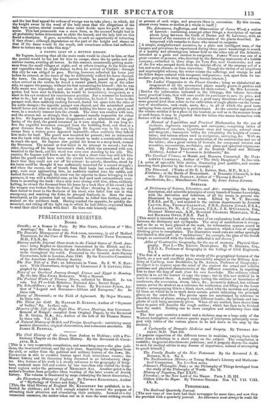HENRY OF MONMOUTH.
THE title of Major Micam.'s romance indicates the subject, but not its extent. Besides a sketch of the foreign wars of Henry the Fifth's reign, from the muster of his army at Southampton till his marriage with Katherine of Valois at Paris, Henry of Monmouth contains an account of the loves and adventures of Mortimer, Earl of March, with Constance de Hugueville, and of a certain mysterious maiden with Mortitner's page. Owen Glendower—the conspiracy of Cambridge, Grey, and others to murder Henry—the sect of the Lollards—with the ministry and death of Sir John Old- castle, besides the intrigues of the French Court, and an episode in Biscay—are also introduced to add variety to the tale, but in reality to produce complexity.
The good points of Major MICHEL are an earnest and amiable feeling, some historical and antiquarian knowledge of the time, to- gether with considerable power in single incidents and situations. His defects are traceable to a want of constructive skill and of practice in composition, as well as to a deficiency perhaps in mental strength, that frequently accompanies amiability. The three stories which he presents to the reader are not interwoven—they run parallel. We are taken from England to Wales, from Wales to France, from France to Spain, by jumps as wide as the Channel ; and in the part which re- lates to Harry of Monmouth, history is so intermingled with fiction, that the reader passes from the dryness of a gazette to the inci- dents if not the imaginativeness of fiction. In the two other plots a similar want of skill is exhibited. The varieties of fortune which Mortimer and Constance undergo are not badly conceived in them- selves, but they are badly connected—less contrived to interest one in the fate of the persons, than to show off the writer's conceptions of the free companions, feudal nobility, and wandering Zingari, or gip- sies of the middle ages. His characters get into difficulties by ac- cident ; they get out of them by luck ; and the punishment of violence and crime does not accompany the rescue, but follows after it like an action at law. Let us illustrate what we mean, though not from an author very attentive to critical canons. In Ivanhoe, Front de Bceuf lends his castle for deeds of violence : it is sacked in conse- quence of those deeds, and he perishes in the flames. In Henry of Monmouth, Beauvilliers, a French noble, carries off Constance to his castle : but she is freed from it by a leader of free companions, instead of her lover • and when this lover afterwards carries a stronghold of Beauvlliers, he lets him escape, in order that they may have a grand combat a l'outrance in the presence of the sove- reigns of the time.
Still, amid much that is crude and incongruous, there are glimpses of better things in our military Major—good conceptions that only fail in their effect from the want of art to make them tell. When Hal takes the disguise of a red-cross knight to see Katherine and judge for himself, and subsequently appears as her knight in the tournament, the scenes, even as they stand, if not very probable, are effective specimens of romance. A descriptive account of the for- malities of chivalry ere the tournament begins, will give an idea of the style of Major MICHEL.
"A long covered building, guarded by pursuivants and heralds, was erected without the lists ; and those who intended to tourney, were directed to hang on wooden figures, allotted for the purpose, their emblazoned shields.
" On the first day, the ladies and knights had the liberty of examining them; and should there be found any against whom any demoiselle had cause of com- plaint, she was thereon to place her finger, as a sign to the pursuivant, who denoted to the judges of the tournament the name of the warnor to whom the shield belonged.
Their duty compelled them to do justice to the complainant, after the mode prescribed by the laws of chivalry.
" The judge held a species of court, where the injured maiden declared her wrongs. If found just, the knight was commanded to quit the scene of the tournament; and if, in contravention of this decree, he should afterwards offer himself at the barriers, he was driven away by blows from the pnrsuivants. " On the second day, a noble knight, with five companions, who to the judges alone had disclosed their names, were to hold the lists against all who chose to oppose them. " On the third day, a general melee was to take place, in which those knights were to be chosen as leaders who had most distinguished themselves in the preceding day's tourney. " The following day the lists were open for the adjustment of such disputes for chivalric precedence as might have arisen during the preceding days. This being concluded, the maidens were again to promenade the covered space,
and the last final appeal for redress of wrongs was to take place ; in which, did the knight swear by the wood of the holy cross that the allegations of the lady were untrue, mortal combat alone could decide upon his guilt or inno- cence. This last promenade was a mere form, as the accused knight had in all probability before determined to abide the hazard, and the lady had ere this found a champion. It gave, nevertheless, to each an opportunity of retracting if they chose; although degradation on the part of the knight and shame on that of the dame would be the result, and conscience seldom had sufficient force to induce any to take this step."
A DARING LEAP OF A HUNTED KNIGHT.
Sir Ingram, knowing that all the main roads would be closed to him, or that the pursuit would be too hot for him to escape, chose the by-paths and cir- cuitous routes, avoiding 111 towns. In this manner, occasionally getting assist- ance from the small villages at night, and at others trusting to the fruits and raw vegetables that he might chance to find, he arrived at Carlisle : through this city he was obliged to pass. Having, however, refreshed his horse just before he entered, at the dawn of day he deliberately walked his horse through the town. On reaching the long narrow bridge, he passed the guard; but when arrived at the centre, he found a second guard, drawn up at the other side, to oppose his passege, without his first accounting for himself: this he was fully aware was impossible ; and since in all probability a description of his person had been sent to Carlisle, he would be immediately recognized, as a slant in his eye rendered his countenance peculiar. For a moment he hesitated what to do ; but at length taking his resolution, he backed his horse to the parapet-wall, then suddenly rushing forward, darted his spurs into the sides of his noble charger; the opposite parapet was cleared, and the astonished guard beheld horse and rider in mid-air, he boldly holding his horse up, to pitch, as it were, in a masterly manner into the stream. The river was swollen with rain, and the stream ran so strongly that it appeared morally impossible for either to live. Sir Ingram and his horse disappeared ; and in admiration of the gal- lantry of the deed, the guard remained as it were stupified. It was long be- fore the engulfed horseman emerged from the bubbling flood, and then at a great distance from the bridge. Although Sir Ingram was in his scat, his escape from a watery grave appeared impossible, when suddenly they beheld him make for land. The guard now mounted for pursuit ; but so intersected was the bank with dikes, that they were forced to make a considerable circuit to reach the spot. Sir Ingram now guided his horse to a steep bank, termed the Stanmers. The animal at first failed in its attempt to ascend ; but the rider, throwing off his large horseman's cloak, which was saturated with wet, bounded to the bank, and his steed was soon seen standing by his side. The country Sir Ingram well knew, and he saw that a short time was still left him before the guard could have made the circuit before-mentioned, and he also knew that they could not cut off his retreat : he quietly, therefore, stood by his horse until he thought it was sufficiently recovered for a second struggle ; and when the enemy, out of breath from their haste but confident of their pray, were seen approaching him, he suddenly vaulted into his saddle, and dashed forward. Although his steed was far superior to those belonging to his pursuers, it was still a doubtful case, as his had used such extraordinary exer- tions in ascending the bank : three only were closing with him, when, suddenly halting, he struck the foremost from his horse by a back blow of his sword ; but the weapon was broken from the force of the blow : throwing it away, he was then forced to trust to the fleetness of his steed, who failed him not in this emergency, and reaching the Eske, he plunged fearlessly in. Here the race terminated, as his pursuers had no inclination to follow him further, and re- mained on the southern bank. Having reached the opposite, he quickly dis- mounted, and taking off the light cap in which he had ridden, requested them to send their chief to drink with him I He then rode leisurely away.



























 Previous page
Previous page